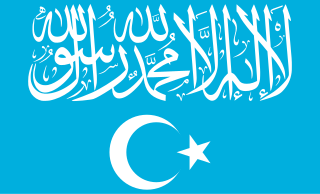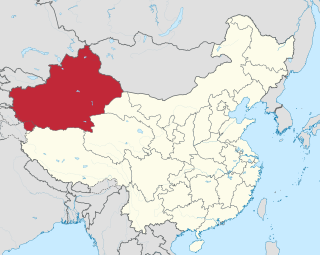
East Turkestan or East Turkistan,also called Uyghuristan,is a loosely-defined geographical region in the northwestern part of the People's Republic of China,on the cross roads of East and Central Asia. The term was coined in the 19th century by Russian Turkologists,including Nikita Bichurin,who intended the name to replace the common Western term for the region,"Chinese Turkestan",which referred to the Tarim Basin in Southern Xinjiang or Xinjiang as a whole during the Qing dynasty. Beginning in the 17th century,Altishahr,which means "Six Cities" in Uyghur,became the Uyghur name for the Tarim Basin. Uyghurs also called the Tarim Basin "Yettishar," which means "Seven Cities," and even "Sekkizshahr",which means "Eight Cities" in Uyghur. Chinese dynasties from the Han dynasty to the Tang dynasty had called an overlapping area the "Western Regions".

The Turkistan Islamic Party (TIP) is a Uyghur Islamic militant organization founded in Pakistan by Hasan Mahsum. Its stated goals are to establish an Islamic state in Xinjiang and Central Asia.

The East Turkestan independence movement is a political movement that seeks the independence of East Turkestan,a large and sparsely-populated region in northwest China,as a nation state for the Uyghur people. The region is currently administered by the People's Republic of China (PRC) in the Xinjiang Uygur Autonomous Region (XUAR). Within the movement,there is widespread support for the region to be renamed,since "Xinjiang" is seen by independence activists as a colonial name. "East Turkestan" is the best-known proposed name as it is the historical geographic name of the region and the name of the two independent states that briefly existed in the region in the first half of the 20th century.

The East Turkestan Liberation Organization (ETLO) was a secessionist Uyghur organization that advocated for an independent Uyghur state named East Turkestan in the Western Chinese province known as Xinjiang. The organization was established in Turkey in late 1997 to fight against the Chinese government in Xinjiang,a territory of ethnic Uyghur majority.

Hasan Mahsum,also known as Abu-Muhammad al-Turkestani and Ashan Sumut,was an Uyghur militant who was the leader of the Turkistan Islamic Party,an Islamic extremist group suspected of having ties with Al Qaeda. He was shot dead in a counter-terrorism operation on October 2,2003 by the Pakistani Army.
Terrorism in China refers to the use of terrorism to cause a political or ideological change in the People's Republic of China. The definition of terrorism differs among scholars,between international and national bodies,and across time—there is no internationally legally binding definition. In the cultural setting of China,the term is relatively new and ambiguous.

The 2008 Kunming bus bombings occurred on 21 July 2008 when explosions aboard two public buses in downtown Kunming,the capital of southwest China's Yunnan province,killed two people. The explosions were deliberate,according to police. The attacks occurred amid heightened tensions due to the Beijing Olympics. Although the Turkestan Islamic Party claimed responsibility for the incident,China later said the explosions were "not an act of terrorism".

The 2008 Kashgar attack occurred on the morning of 4 August 2008,in the city of Kashgar in the Western Chinese province of Xinjiang. According to Chinese government sources,it was a terrorist attack perpetrated by two men with suspected ties to the Uyghur separatist movement. The men reportedly drove a truck into a group of jogging police officers,and proceeded to attack them with grenades and machetes,resulting in the death of 16 officers.

The World Uyghur Congress (WUC) is a US funded international organization of exiled Uyghur groups that claims to "represent the collective interest of the Uyghur people" both inside and outside of the Xinjiang Uyghur Autonomous Region of the People's Republic of China. The World Uyghur Congress claims to be a nonviolent and peaceful movement that opposes what it considers to be the Chinese occupation of East Turkestan (Xinjiang) and advocates rejection of totalitarianism,religious intolerance and terrorism as an instrument of policy. It has been called the "largest representative body of Uyghurs around the world" and uses more moderate methods of human rights advocacy to influence the Chinese government within the international community in contrast to more radical Uyghur organizations.
Memtimin Memet,also known in his nom de guerre Abdul Haq al-Turkistani,is a Uyghur Islamic militant who leads the Turkistan Islamic Party. The United States Treasury reported he took over leadership of the organization in 2003,following the death of its previous leader,and took a seat on al-Qaeda's shura in 2005.

The 2011 Kashgar attacks were a series of knife and bomb attacks in Kashgar,Xinjiang,China on July 30 and 31,2011. On July 30,two Uyghur men hijacked a truck,killed its driver,and drove into a crowd of pedestrians. They got out of the truck and stabbed six people to death and injured 27 others. One of the attackers was killed by the crowd;the other was brought into custody. On July 31,a chain of two explosions started a fire at a downtown restaurant. A group of armed Uyghur men killed two people inside of the restaurant and four people outside,injuring 15 other people. Police shot five suspects dead,detained four,and killed two others who initially escaped arrest.

Abdul Shakoor al-Turkistani,also known as Abdul Shakoor Damla and Emeti Yakuf,was the emir of the East Turkistan Islamic Party,an Islamist organisation that seeks independence for China's Xinjiang province and for it to become an Islamic state. In August 2011,Abdul Shakoor reportedly appeared in a video with his face obscured taking responsibility for the 2011 Kashgar attacks and 2011 Hotan attack.

The Xinjiang conflict,also known as the East Turkistan conflict,Uyghur–Chinese conflict or Sino-East Turkistan conflict,is an ethnic geopolitical conflict in what is now China's far-northwest autonomous region of Xinjiang,also known as East Turkistan. It is centred around the Uyghurs,a Turkic ethnic group who constitute a plurality of the region's population.
On 26 June 2013,rioting broke out in Shanshan County,in the autonomous region of Xinjiang,China. 35 people died in the riots,including 22 civilians,two police officers and eleven attackers.
On 28 October 2013,a car ran over pedestrians and crashed in Tiananmen Square,Beijing,China,in a terrorist suicide attack. Five people died in the incident;three inside the vehicle and two others nearby. Police identified the driver as Usmen Hasan and the two passengers as his wife,Gulkiz Gini,and his mother,Kuwanhan Reyim. An additional 38 people were injured.
Events in the year 2014 in China.
On the early morning of Wednesday,30 July 2014,Juma Tahir,the imam of China's largest mosque,the Id Kah Mosque in northwestern Kashgar,was stabbed to death by three young male Uyghur extremists. Religious leaders across denominations condemned the attack.
The East Turkistan Education and Solidarity Association is a Uyghur Islamist organisation based in Istanbul,Turkey.

The Turkistan Islamic Party in Syria is the Syrian branch of the Turkistan Islamic Party,an armed Uyghur Jihadist group with a presence in the Syrian Civil War. While the TIP has been active in Syria,the organization's core leadership is based in Afghanistan and Pakistan,with a presence in its home territory of China.
In May 2014,the Government of the People's Republic of China (PRC) launched the "Strike Hard Campaign against Violent Terrorism" in the far west province of Xinjiang. It is an aspect of the Xinjiang conflict,the ongoing struggle by the Chinese Communist Party (CCP) and the Chinese government to manage the ethnically diverse and tumultuous province. According to critics,the CCP and the Chinese government have used the global "war on terrorism" of the 2000s to frame separatist and ethnic unrest as acts of Islamist terrorism to legitimize its counter-insurgency policies in Xinjiang. Chinese officials have maintained that the campaign is essential for national security purposes.








